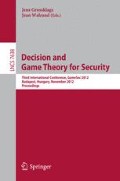Abstract
We study incentive problems in electricity distribution when customer energy usage is imperfectly observable by the utility. Thus, we assume that each customer has private information about the amount of his consumed energy. Imperfect observability of individual user demand results is non-technical energy losses. In developing countries, these losses amount to 20 − 30% per year, and are largely attributed to theft by residential customers. Reducing these losses will allow a marked increase in efficiency of the electricity distribution. Usage of smart energy management devices enables new functionalities and brings the potential for such increased efficiency. However, employing smart energy management devices also entails a new set of problems. Typically, such devices are commercially produced, and employ off-the-shelf information technology (IT) solutions with inherent security vulnerabilities. Thus, due to technology limitations and cost constraints, smart devices are vulnerable to tampering and may enable systemic energy theft, threatening to reduce, or even erase the gains in efficiency. In this paper, we address incentives of utility company to combat theft (i.e., non-technical losses), when utility is subject to rate (tariff) regulation. From our analysis, such regulated utilities invest less than socially optimal in theft reduction. We suggest that regulators should include explicit targets for the allowable losses to remedy the problem of incentive misalignment.
Access this chapter
Tax calculation will be finalised at checkout
Purchases are for personal use only
Preview
Unable to display preview. Download preview PDF.
References
Antmann, P.: Reducing technical and non-technical losses in the power sector. Technical report, World Bank Group Energy Sector (2009)
Anderson, R., Fuloria, S.: Who controls the off switch? In: 2010 First IEEE International Conference on Smart Grid Communications (SmartGridComm), pp. 96–101 (October 2010)
Jeff Smith, N.G.: Smart meters take bite out of electricity theft (September 2011), http://news.nationalgeographic.com/news/energy/2011/09/110913-smart-meters-for-electricity-theft/
Cleveland, F.M.: Cyber security issues for advanced metering infrastructure (ami). In: 2008 IEEE Power and Energy Society General Meeting-Conversion and Delivery of Electrical Energy in the 21st Century, pp. 1–5. IEEE (2008)
Smith, T.B.: Electricity theft: a comparative analysis. Energy Policy 32(18), 2067–2076 (2004)
McLaughlin, S., Podkuiko, D., McDaniel, P.: Energy Theft in the Advanced Metering Infrastructure. In: Rome, E., Bloomfield, R. (eds.) CRITIS 2009. LNCS, vol. 6027, pp. 176–187. Springer, Heidelberg (2010)
Anderson, R., Fuloria, S.: On the security economics of electricity metering. In: The Ninth Workshop on the Economics of Information Security, Citeseer (2010)
Kassakian, J.G., Schmalensee, R.: The future of electric grid: An interdisciplinary MIT study. Technical report, Massachusetts Institute of Technology (2011)
Sam Dolnick, A.P.: Indian officials wage war on energy theft (July 2009), http://dailyreporter.com/2009/07/06/indian-officials-wage-war-on-energy-theft/
PPPIRC: Theft / non-technical losses (water and electricity) (2011), http://ppp.worldbank.org/public-private-partnership/legislation-regulation/laws/theft-nontechnical-loss
Victor, D.G., Heller, T.C. (eds.): The Political Economy of Power Sector Reform. Cambridge University Press (2009)
Joskow, P.L.: Incentive regulation in theory and practice: Electricity distribution and transmission networks. In: Economic Regulation and Its Reform: What Have We Learned? NBER Chapters. National Bureau of Economic Research, Inc. (Julio Dic 2011)
Vogelsang, I.: Electricity transmission pricing and performance-based regulation. CESifo Working Paper Series 1474, CESifo Group Munich (2005)
Laffont, J., Martimort, D.: The theory of incentives: the principal-agent model. Princeton Univ. Pr. (2002)
Bolton, P., Dewatripont, M.: Contract Theory, vol. 1. The MIT Press (2005)
Armstrong, M., Sappington, D.E.: Recent Developments in the Theory of Regulation. Handbook of Industrial Organization, vol. 3, pp. 1557–1700. Elsevier (2007)
Laffont, J.J., Tirole, J.: A Theory of Incentives in Procurement and Regulation, 1st edn., vol. 1. The MIT Press (1993)
Amrstong, M., Cowan, S., Vickers, J.: Nonlinear pricing and price cap regulation. Journal of Public Economics 58(1), 33–55 (1995)
Tirole, J.: A Theory of Industrial Organizaton. The MIT Press (1988)
Ho, Y.C., Luh, P., Muralidharan, R.: Information structure, stackelberg games, and incentive controllability. IEEE Transactions on Automatic Control 26(2), 454–460 (1981)
Ho, Y.C., Luh, P.B., Olsder, G.J.: A control-theoretic view on incentives. Automatica 18(2), 167–179 (1982)
Shen, H., Basar, T.: Optimal nonlinear pricing for a monopolistic network service provider with complete and incomplete information. IEEE Journal on Selected Areas in Communications 25(6), 1216–1223 (2007)
Armstrong, M., Vickers, J.: Welfare effects of price discrimination by a regulated monopolist. RAND Journal of Economics 22(4), 571–581 (1991)
Author information
Authors and Affiliations
Editor information
Editors and Affiliations
Rights and permissions
Copyright information
© 2012 Springer-Verlag Berlin Heidelberg
About this paper
Cite this paper
Amin, S., Schwartz, G.A., Tembine, H. (2012). Incentives and Security in Electricity Distribution Networks. In: Grossklags, J., Walrand, J. (eds) Decision and Game Theory for Security. GameSec 2012. Lecture Notes in Computer Science, vol 7638. Springer, Berlin, Heidelberg. https://doi.org/10.1007/978-3-642-34266-0_16
Download citation
DOI: https://doi.org/10.1007/978-3-642-34266-0_16
Publisher Name: Springer, Berlin, Heidelberg
Print ISBN: 978-3-642-34265-3
Online ISBN: 978-3-642-34266-0
eBook Packages: Computer ScienceComputer Science (R0)

